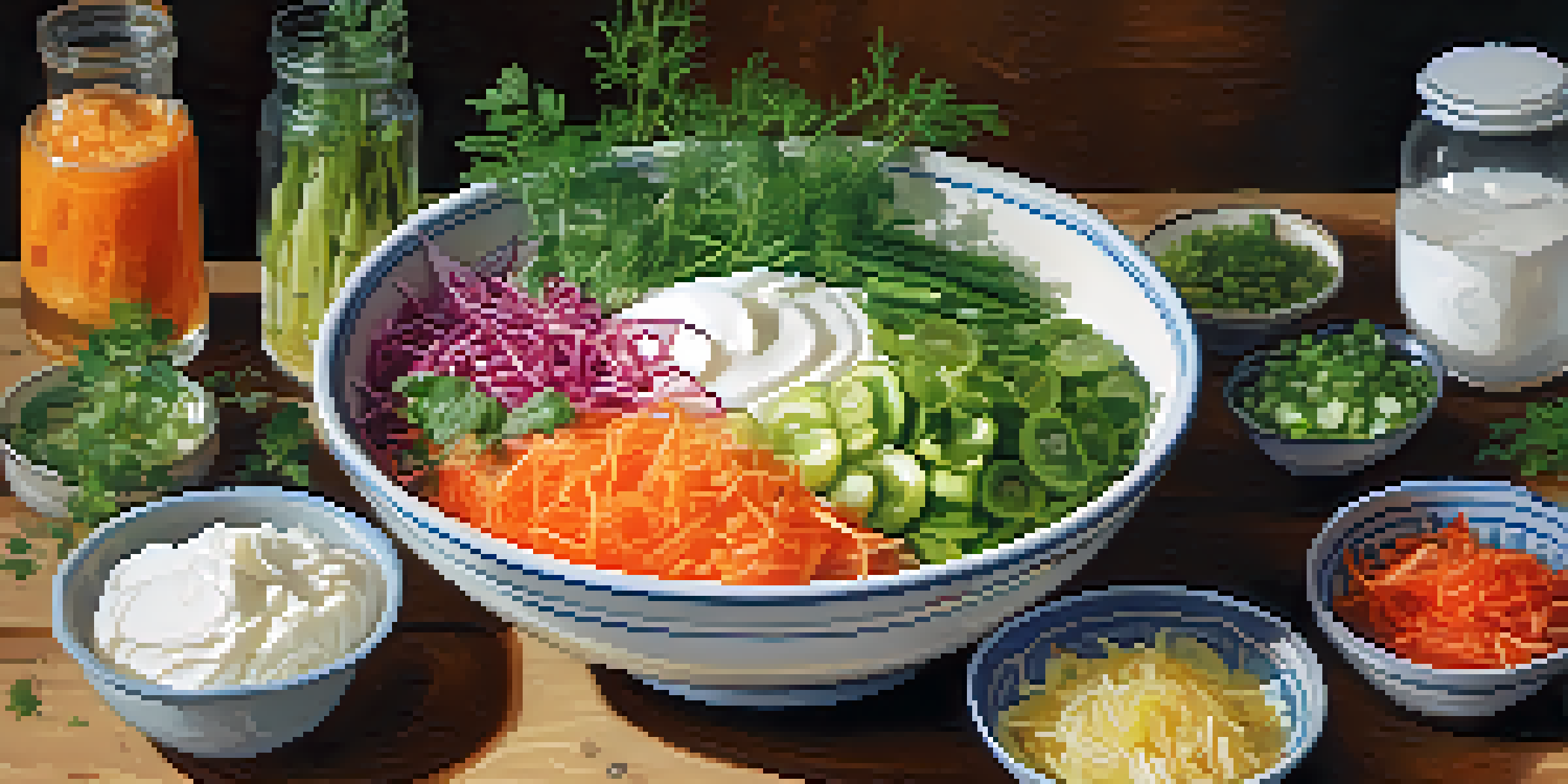Understanding the Basics of Fermented Raw Foods in Diets

What Are Fermented Raw Foods and Why They Matter
Fermented raw foods are foods that have undergone a natural fermentation process, often involving beneficial bacteria. This process not only preserves the food but also enhances its nutritional value. Common examples include sauerkraut, kimchi, and kefir, which are rich in probiotics.
Let food be thy medicine and medicine be thy food.
These foods play a crucial role in gut health, supporting digestion and boosting the immune system. They can also help in reducing inflammation and even improving mental health due to the gut-brain connection. Understanding these benefits can motivate you to incorporate more fermented foods into your diet.
Incorporating fermented raw foods doesn't mean you have to overhaul your diet. Simple additions, such as a side of kimchi with your meals or a splash of kombucha instead of soda, can make a significant difference in your overall health.
The Science Behind Fermentation: How It Works
Fermentation is a metabolic process where microorganisms like bacteria, yeast, or molds convert sugars and starches into acids, gases, or alcohol. This process not only preserves food but also creates unique flavors and textures. It’s like a culinary magic trick that transforms basic ingredients into something extraordinary.

During fermentation, beneficial bacteria multiply, creating a diverse microbial environment that can outcompete harmful bacteria. This results in foods that are not only safe to eat but also beneficial for your gut flora. Think of it as a friendly battle where the good guys emerge victorious to enhance your health.
Fermented Foods Boost Gut Health
Fermented raw foods, like kimchi and yogurt, are rich in probiotics that enhance digestion and support a healthy immune system.
The end products of fermentation, such as lactic acid, not only preserve the food but also provide additional health benefits. This is why foods like yogurt and pickles have both a tangy taste and a reputation for being good for your gut.
Health Benefits of Including Fermented Raw Foods
Including fermented raw foods in your diet can lead to numerous health benefits. One of the most notable is improved digestion, as the probiotics in these foods help break down food and absorb nutrients more effectively. This is especially beneficial for those who suffer from digestive issues like bloating or irritable bowel syndrome.
The gut is a treasure chest of good bacteria that can boost your mood, immune system, and overall health.
Moreover, these foods can enhance your immune system, making it more resilient to infections and illnesses. A healthy gut is often associated with a stronger immune response, which means that your body is better equipped to fend off colds or other ailments.
Lastly, fermented raw foods can contribute to mental well-being. Research has shown that a healthy gut can positively influence your mood and cognitive function, making these foods a delicious way to support both physical and mental health.
How to Incorporate Fermented Raw Foods into Your Diet
Integrating fermented raw foods into your daily meals can be simple and enjoyable. Start by adding a serving of yogurt or kefir to your breakfast routine, providing a probiotic boost to kickstart your day. You can also experiment with different flavors of fermented vegetables as side dishes or in salads.
Another easy way to include these foods is by swapping out traditional condiments for their fermented counterparts. For instance, try using kimchi as a topping for sandwiches or burgers instead of regular pickles for an extra zing. This small change can dramatically enhance the flavor profile of your meals while benefiting your gut.
Simple Ways to Add Ferments
You can easily incorporate fermented foods into your diet by adding yogurt to breakfast or using kimchi in sandwiches and salads.
Lastly, consider making your own fermented foods at home. It’s a fun and rewarding process that allows you to customize flavors to your liking. Plus, homemade ferments can be more affordable than store-bought options, giving you control over the ingredients used.
Common Types of Fermented Raw Foods to Try
There’s a wide variety of fermented raw foods to explore, each offering unique flavors and health benefits. Starting with some classics, yogurt and kefir are excellent sources of probiotics, making them a staple in many diets. They can be enjoyed alone or as part of smoothies, dressings, or baked goods.
Fermented vegetables, such as sauerkraut and kimchi, are not only tasty but also packed with nutrients. These pickled delights can add a crunch to salads or a kick to your tacos. Plus, they are relatively easy to make at home with just a few simple ingredients.
Don’t overlook beverages like kombucha or water kefir, which provide a refreshing alternative to sugary drinks. These fizzy, fermented drinks can satisfy your cravings for something bubbly while delivering gut-friendly probiotics.
Potential Risks and Considerations
While fermented raw foods offer a plethora of health benefits, there are some considerations to keep in mind. For individuals with compromised immune systems, certain fermented foods may pose risks due to the presence of live bacteria. It's essential to consult with a healthcare professional if you have any concerns.
Additionally, not all fermented foods are created equal. Some commercially produced options may be pasteurized, which kills off beneficial bacteria. Always check labels and opt for products that specify they contain live cultures to maximize health benefits.
Considerations for Fermented Foods
While beneficial, it's important to choose products with live cultures and consume fermented foods in moderation to avoid potential risks.
Lastly, moderation is key. Fermented foods can be rich in sodium, especially pickled varieties, so it’s wise to consume them in reasonable amounts to avoid any negative effects on your health.
Final Thoughts on Fermented Raw Foods
Incorporating fermented raw foods into your diet can be a delightful and healthful journey. Not only do these foods pack a punch of flavor, but they also contribute significantly to your gut health and overall well-being. The variety of options available makes it easy to experiment and find what you love.
As you explore the world of fermentation, you might just discover new favorites that enhance your meals and promote better health. Plus, the process of making your own ferments can be a rewarding experience that connects you with your food.

So why not give it a try? Start small, enjoy the flavors, and embrace the benefits of fermented raw foods in your everyday life.